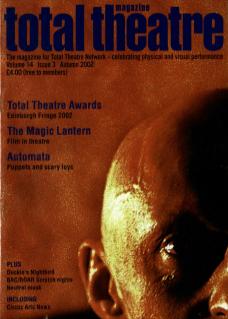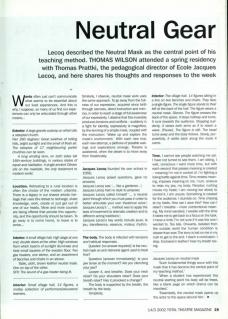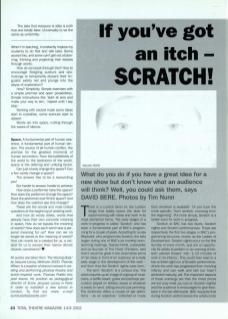Words often just can't communicate what seems to be essential about our lived experiences. And this is why, I suppose, so many of us find our experiences can only be articulated through other means...
Exterior: A large granite outcrop on which sits a steepled church. Pan 360 degrees: Great swathes of rolling hills, bright sunlight and the smell of fresh air. The steeples of 17 neighbouring parish churches can be seen.
A long winding lane, on both sides tall 16th Century buildings, in various states of repair and habitation. A single ancient Citroen sits on the roadside, the only testament to modern world.
Location. Retreating to a rural location is often the choice of the modern urbanite. There is a legacy in our shared artistic heritage that uses this retreat to recharge, share knowledge, work, create or just get out of one of our heads. More and more courses are being offered that provide this opportunity, and the opportunity should be taken. To go away is to come home, to leave is to arrive...
Interior: A small village hall, high stage at one end, double doors at the other. High windows from which beams of sunlight illuminate and heat small squares of the wooden floor. Two gas heaters, one stereo, and an assortment of benches and chairs in an alcove.
Table, cloth, brown leather neutral mask. One on top of the other.
SFX: The sound of a gas heater being lit.
Interior: Small village hall, 14 figures, a motley collection of performers/educators/ learners.
Similarly, I observe, neutral mask work uses the same approach. To go away from the fullness of our expression, acquired since birth through osmosis, direct instruction and mimicry, in order to reach a stage of full awareness of our expressivity. I observe that this invariably produces tensions and conflicts – suddenly in a fight for identity, expressivity is magnified, by the donning of a simple mask, coupled with the instruction: 'Wake up and explore the mask's environment.’ With each new trial, each new attempt, a plethora of possible wakings and explorations emerge. Theatre is awakened, when the desire is to move away from theatricality
Jacques Lecoq founded his own school in 1956;
Jacques Lecoq posed questions, gave no answers;
Jacques Lecoq was ‘... like a gardener...’;
Jacques Lecoq had no style to propose;
Jacques Lecoq called himself '... a neutral point through which you must pass in order to better articulate your own theatrical voice';
Jacques Lecoq's ‘... method was to apply the laws of movement to dramatic creation and to different acting traditions';
Jacques Lecoq's key words include jouer, le jeu, transference, essence, moteur, rhythm.
The body. The body is infected with tensions and habitual responses.
Question [no answer required]: Is the neutral mask an anti-retroviral agent used to treat this?
Question [answer immediately]: Is your jaw tense at the moment? Are you clenching your jaw?
Loosen it, and breathe. Does your neck relax? Do your shoulders relax? Does your breath relax? Has it provoked a change?
The body is supported by the breath, the breath by the body.
Simplicity.
Interior: The village hall. 14 figures sitting in a line on two benches and chairs. They face a single figure. The single figure stands to their left at the back of the hall. The figure wears a neutral mask. Silence. The figure crosses the back of the space. It stops halfway and turns. It runs towards the audience. Stopping suddenly, it raises both arms as if to reach a wave. (Pause.) The figure is still. The head turns away and the body follows. Slowly, purposefully, it walks back along the route it came.
Time. I cannot see people watching me yet. I have not turned to see them. I am sitting. I wait, conscious I want more time, but with each second that passes meaning is created – meaning I'm not in control of. I'm fighting a losing battle against time. Time creates meaning, imposes meaning on me. I turn, anxious to relax my jaw, my body. Paradox: rushing moves my head; I am moving too slowly to control it. I am unsure. Something is created for the audience. I stumble on. Time chasing at my heels. How can I save this? How can I relax? I breathe – more unintentional meaning. My mind wanders; I wrestle with the time it takes me to get back to a focus on the task. I move a limb; I'm not sure if it was the one I wanted to. Too late. Onwards. Isolated from the outside world the human condition is clearer than ever. The irony is lost on me in my rush to get to the end. I reach a conclusion. I stop. Enclosed in leather I hear my breath racing.
Jacques Lecoq on neutral mask
'Such fundamental things occur with this mask that it has become the central point of my teaching method.'
'When a student has experienced this neutral starting point his body will be freed, like a blank page on which drama can be inscribed.’
‘Essentially, the neutral mask opens up the actor to the space around him.'
'The idea that everyone is alike is both true and totally false. Universality is not the same as uniformity.
When I'm teaching, I constantly implore my students to do first and talk later. Some accept this, and some can't get out of planning, thinking and projecting their desires through words.
How do we break through this? How to encourage fledgling auteurs and dramaturgs to temporarily discard their linguistic safety net and plunge into the abyss of exploration?
How? Simplicity. Simple exercises with a simple premise and open possibilities. Simple instructions like 'start at zero and make your way to ten', 'repeat until I say stop'.
Working with neutral mask some ideas start to crystallise, some avenues start to appear.
Words arc into space, cutting through the waves of silence.
Space. A fundamental part of human existence. A fundamental part of human tension. The source of all human conflict, the premise for the greatest moments of human connection. From the battlefields of the world to the bedrooms of the world, space is the defining and unifying factor.
Can just a body change the space? Can a few words change a space?
The answer has to be a resounding yes!
But harder to answer, harder to achieve:
How does a performer take the space? How does the performer change the space? Does the performer ever fill the space? And how does the watcher see this change?
These are the crucial and most critical questions at the beginning of creating work.
And how do words relate, words that already have their own concrete meaning in space. How do we bypass the meaning of words? How does each word have a personal meaning for us? How can we no longer be slaves to the meaning of words? How can words be a catalyst for us, a catalyst for us to exceed their narrow, almost didactic constraints?
All quotes are taken from The Moving Body by Jacques Lecoq, Methuen 2000. Thomas Wilson is a teacher of drama involved in creating and performing physical theatre and butoh-inspired work. Thomas Prattki this year leaves his position as pedagogical director of Ecole Jacques Lecoq in Paris in order to establish a new school in London.


